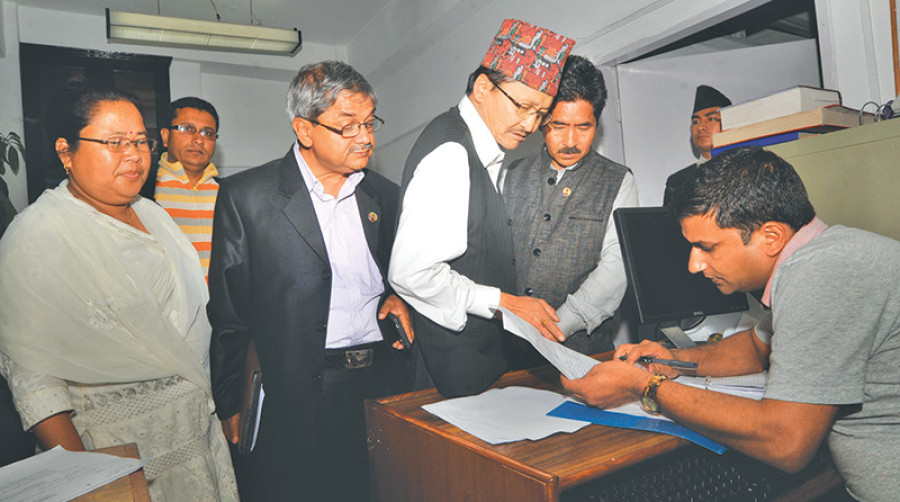National
Ruling coalition, Morcha file amendment proposals to charter revision bill
After marathon inter-party negotiations, the ruling alliance on Saturday night registered amendment proposals to the charter revision bill as per the agreement forged with the Samyukta Loktantrik Madhesi Morcha and the Federal Alliance on April 22.
Binod Ghimire
After marathon inter-party negotiations, the ruling alliance on Saturday night registered amendment proposals to the charter revision bill as per the agreement forged with the Samyukta Loktantrik Madhesi Morcha and the Federal Alliance on April 22. However, they failed to agree on a single proposal as the Sanghiya Samajbadi Forum-Nepal (SSFN) had differences over proposal of the ruling parties and the Rastriya Janta Party-Nepal (RJP-N).
A total of 50 proposals have been registered in the amendment bill, including one each from the ruling parties and the SSFN and 48 from other parties, according to Netra Bhusal at the Parliament Secretariat.
The ruling Nepali Congress, CPN (Maoist Centre), Rastriya Prajatantra Party and the RJP-N, and the SSFN held a five hour-long meeting to table a single amendment. But the ruling parties and the RJP-N submitted one proposal seeking revision in five provisions, while the SSFN submitted another proposal seeking revisions in same provisions.
The government on April 11 had withdrawn the bill tabled on January 8 and replaced it with another. The revision in the amendment was registered in the spirit of the agreement reached with the regional parties last week.
The ruling alliance has filed for a revision on the amendment bill on Article 274(4a) with a provision to form a federal commission to recommend the revision of the boundary within three months which will be endorsed by the central parliament without the election of federal and provincial assemblies. The commission will have proportional inclusive representation. The SSFN has a reservation over the word “recommendation”. In its amendment proposal, the SSFN has registered the amendment which envisions adopting the report of the federal commission mandatorily. “We could not agree on just recommendation. The commission should be authorised to create new provinces or revise the boundary,” said SSFN Co-chair Rajendra Shrestha. Besides, the party has also proposed that the commission should also have the authority to finalise the tasks of forming autonomous, special and protected areas which was left incomplete by the Local Level Restructuring Commission.
In the amendment proposal by the ruling alliance, an additional clause has been incorporated in Article 7 of the constitution to enlist all the languages recommended by the Language Commission in the annex of the constitution. This would allow the provinces to choose the national languages from the recommendations.
“We had some differences with the SSFN which will be sorted out before voting,” said Tek Bahadur Basnet Chief Whip of the Maoist Centre.
Among the 50 proposals, 34 have been filed by the main opposition CPN-UML alone, seeking revision in various provisions in the amendment bill. The opposition parties, including the UML, CPN-ML, Nepal Majdoor Kisan Party and Rastriya Janamorcha, have sought revision in all 11-points in the amendment. According to UML Chief Whip Bhanu Bhakta Dhakal, they have registered revision on the amendment bill to Article 274 (4a) which authorises federal parliament to endorse the changes in the revision of boundaries in consultation with the provincial assemblies instead of mandatory agreement from the provinces. The opposition parties are for continuing the existing constitutional provision which makes it mandatory to have approval from the provincial assemblies for the revision in the boundaries.
Similarly, the opposition has registered revision on the amendment to Article 86 (2) (a), barring chief and deputy chiefs of municipalities and rural municipalities (village councils) from being part of an electoral college that will elect the national assembly. It is for continuity in the existing provision in the constitution which authorises them to be the part of electoral college.
Nepal Loktantrik Forum led by Bijay Kumar Gachhadar has also registered revision seeking amendment for the proportional representation in national assembly. It has also sought revision in Article 287 with a provision to authorise the federal commission to take decision on the disputed five districts—Kanchanpur, Kailali, Sunsari, Morang and Jhapa—based on five-criteria of identity and four-criteria of capability.
As the amendments are higher and the ruling alliance is yet to ensure two-thirds majority, Parliament is likely to form a special committee to find a consensus to decrease their numbers. “We have been told by the government that the discussion will be held in the special committee to forge consensus,” Dhakal told the Post, adding the UML is still open to finding a consensus through dialogue.
NUMBER GAME
With the government preparing to take ahead the amendment proposal despite objection from the main opposition, CPN-UML, all that the ruling parties need now to see the process through is two-thirds majority in the House. The leaders of the ruling coalition have been claiming that the proposal would be endorsed easily even if the UML refuses to lend its support. As of Saturday evening, here is where the parties stand in Parliament to decide the proposal’s fate.
Total votes: 593
Two-thirds requirement: 396
Ruling Coalition
Nepali Congress: 207
CPN-Maoist Centre: 81
Ratriya Prajatantra Party: 37
Rastriya Janata Party-Nepal: 24
Sanghiya Samajbadi Forum-Nepal: 15
Nepal Loktantrik Forum: 18
CPN United: 3
Pariwar Dal: 2
Madhes Samata Party: 1
Sanghiya Loktantrik Rastriya Manch-Tharuhat: 1
Samajbadi Janata Party: 1
Akhanda Nepal: 1
Nepali Janata Dal: 1
Janajagaran Party: 1
Khumbuwan Rastriya Morcha: 1
Independent: 1
Total: 396
Opposition Front
CPN-UML: 181
CPN-ML: 5
Nepal Majdoor Kisan Party: 4
Rastriya Janamorcha: 3
Bouddhik Parishad: 1
Bahujan Shakti Party: 1
Total: 195
Undecided
Tharuhat Tarai Party-Loktantrik: 1
Lawmakers who cannot vote: 2




 21.12°C Kathmandu
21.12°C Kathmandu














